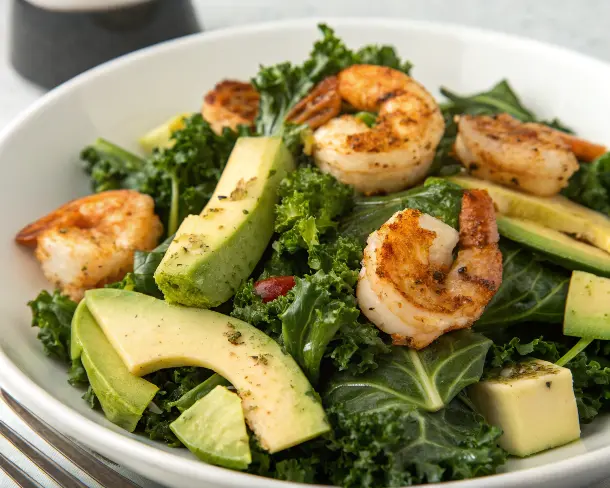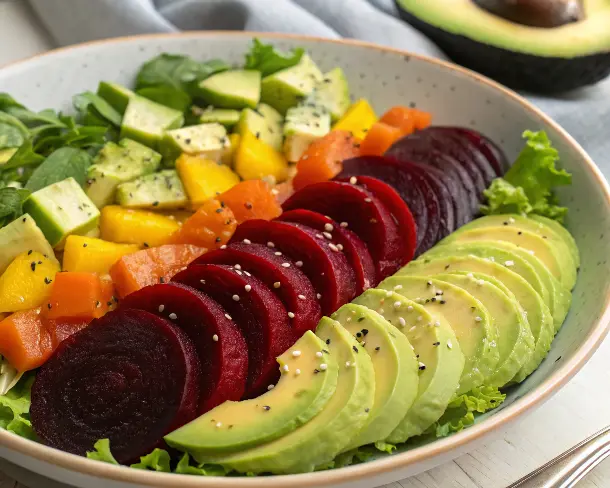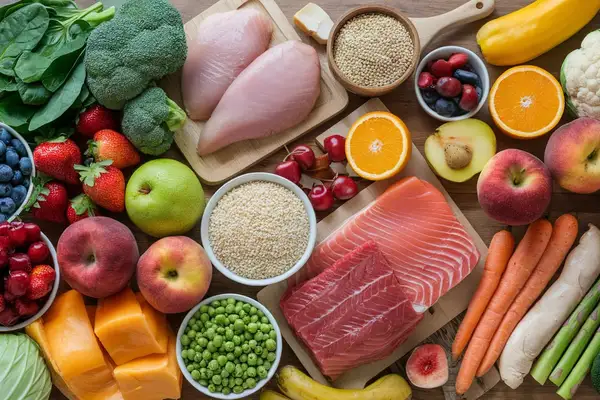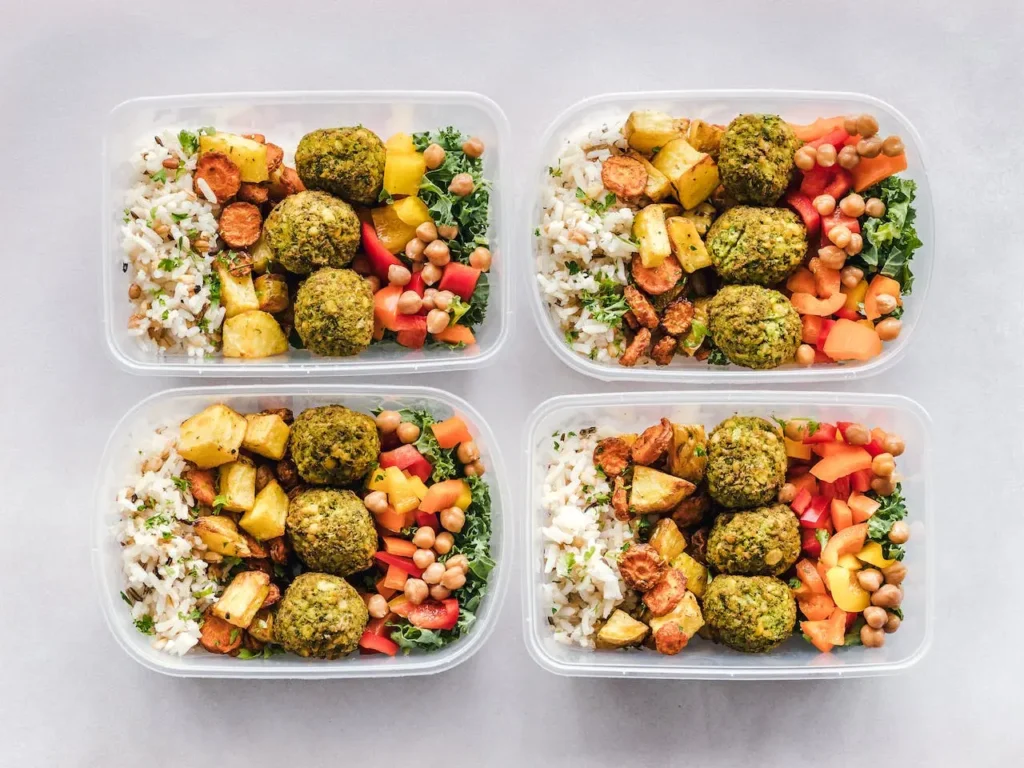7-Day Diet Plan for Hashimoto’s Disease: Thyroid Healing Foods

What Is Hashimoto Disease?
This post may contain affiliate links, meaning I may earn a commission if you make a purchase, at no extra cost to you. I only recommend products I trust. Thank you for your support.
Hashimoto’s disease is an autoimmune condition where the body’s immune system mistakenly attacks the thyroid gland.
This can lead to hypothyroidism, a condition where the thyroid doesn’t produce enough hormones.
Hashimoto disease is the most common cause of hypothyroidism and can result in symptoms like fatigue, weight gain, joint pain, and brain fog.
Do you want delicious home delivered meals to your door with FREE shipping? Use my exclusive link below to get started:
What Causes Hashimoto Disease?
Although the exact cause of Hashimoto’s disease isn’t fully understood, several factors are believed to contribute to its development.
Here are some key elements that may trigger or exacerbate the condition:
- Autoimmune Reaction: The immune system mistakenly attacks the thyroid gland, causing inflammation and impaired function.
- Genetic Predisposition: A family history of thyroid or other autoimmune disorders increases the risk.
- Environmental Triggers: Infections, exposure to toxins, and other environmental factors may initiate or worsen the autoimmune response.
- Hormonal Imbalances: Changes in hormone levels, such as those occurring during pregnancy, can contribute to disease onset.
- Nutritional Factors: Both excessive and deficient iodine intake, as well as other dietary imbalances, may play a role.
- Stress: Chronic emotional or physical stress can disrupt immune regulation and potentially trigger autoimmune processes.
Hashimoto’s Disease Symptoms
Hashimoto’s disease symptoms can vary widely and often develop gradually and many individuals experience a range of signs that indicate thyroid dysfunction.
Here are some common symptoms:
- Fatigue: Persistent tiredness and low energy levels.
- Weight Gain: Unexplained weight gain or difficulty losing weight.
- Cold Sensitivity: Feeling unusually sensitive to cold temperatures.
- Dry Skin and Hair: Skin may become dry, and hair can thin or become brittle.
- Joint and Muscle Pain: Aching muscles and stiff joints are common complaints.
- Constipation: Slower digestion leading to constipation.
- Depression and Mood Swings: Changes in mood, including feelings of depression or anxiety.
- Goiter: An enlarged thyroid gland that may cause a visible swelling in the neck.
- Cognitive Issues: Problems with concentration or memory, often referred to as “brain fog.”
- Menstrual Irregularities: For women, changes in menstrual cycles can occur.
Best Foods for Hashimoto’s Disease
Here are some of the foods that you can include in your Hashimoto diet food list:
- Leafy Greens: Spinach, kale, and Swiss chard are rich in vitamins and minerals that support thyroid function, and cruciferous vegetables (in moderation, as cooking can reduce goitrogenic effects)
- Seafood: Fish like salmon, mackerel, and sardines provide omega‑3 fatty acids, are rich in selenium which is crucial for thyroid hormone production and protects the thyroid gland from oxidative stress.
- High-Quality Proteins: Lean meats (chicken, turkey), grass fed beef, wild-caught fish, eggs, and plant-based proteins (beans, lentils), which provide amino acids essential for hormone synthesis.
- Gluten-Free Grains: Quinoa, rice, and gluten-free oats can be easier to digest for many with autoimmune conditions.
- Antioxidant-Rich Berries: Blueberries, strawberries, and raspberries help fight oxidative stress and combat inflammation.
- Nuts and Seeds: Almonds, walnuts, and chia seeds are great sources of healthy fats and fiber.
- Fermented Foods: Sauerkraut, kimchi, and kefir supports a healthy gut microbiome, which is linked to immune function.
Worst Foods for Hashimoto’s Disease
Here’s a look at some of the worst foods for Hashimoto’s:
- Gluten-Containing Products: Wheat, barley, rye, and products made with these grains can aggravate inflammation and trigger autoimmune responses.
- Highly Processed Foods: Snack foods, fast food, and pre-packaged meals are high in refined sugars and additives, which contribute to systemic inflammation and may worsen hormonal imbalances.
- Soy Products: Tofu, soy milk, edamame contain goitrogens that can interfere with thyroid hormone production, especially if consumed in large amounts.
- Artificial Sweeteners and Trans Fats: Diet sodas, packaged snacks with trans fats, and foods containing artificial sweeteners can disrupt metabolic processes and increase inflammatory responses.
- Refined Carbohydrates: White bread, pastries, and other highly processed carbs may lead to blood sugar imbalances and promote inflammation, which could negatively affect thyroid function.
- Dairy Products: Milk, cheese, and yogurt (for those sensitive to dairy) may trigger inflammation or digestive issues in some individuals.
- Excessive Iodine: Overconsumption of iodine supplements or high-iodine seaweeds can worsen thyroid dysfunction, so intake should be monitored.
7-Day Diet Plan for Hashimoto’s Disease
This 7-day diet plan for Hashimoto’s disease features gluten-free and anti-inflammatory meals designed to support thyroid function, balance hormones, and reduce autoimmune flare-ups.
This Hashimoto’s diet plan includes thyroid healing foods and delicious Hashimoto’s disease diet recipes for breakfast, lunch, and dinner that are easy to prepare.

Day 1
Breakfast:
- Spinach and Blueberry Smoothie: Blend 1 cup fresh spinach, ½ cup blueberries, 1 tbsp chia seeds, and 1 cup unsweetened almond milk until smooth.
Lunch:
- Quinoa Salad with Roasted Vegetables: Roast a mix of bell peppers, zucchini, and red onions (about 1 cup total) and toss with 1 cup cooked quinoa. Drizzle with a lemon-tahini dressing for extra tang.
Dinner:
- Lentil Soup with Steamed Broccoli: Simmer 1 cup lentils with chopped carrots, celery, and a pinch of turmeric until tender. Serve with 1 cup steamed broccoli drizzled with 1 tsp olive oil.
Snacks:
- Walnuts and Green Apple: Enjoy 1 oz of walnuts paired with one green apple for a refreshing and energizing snack.

Day 2
Breakfast:
- Avocado Toast on Gluten-Free Bread: Toast 2 slices of gluten‑free bread, spread ½ mashed avocado on top, and sprinkle 1 tsp hemp seeds for crunch.
Lunch:
- Creamy Shrimp Vegetable Skillet: Sauté 6 oz shrimp with a mix of seasonal vegetables in a light cream sauce made from cashew cream; season with garlic and herbs.
Dinner:
- Baked Salmon with Steamed Asparagus and Quinoa: Bake a 6‑oz salmon fillet seasoned with lemon and dill. Serve alongside 1 cup steamed asparagus and 1 cup cooked quinoa.
Snacks:
- Herbal Tea with Mixed Nuts: Sip on a cup of herbal tea and enjoy a small handful (1 oz) of mixed nuts.

Day 3
Breakfast:
- Gluten‑Free Oatmeal with Strawberries and Honey: Prepare ½ cup gluten‑free oats and top with ½ cup sliced strawberries, a drizzle (1 tsp) of honey, and a pinch of cinnamon.
Lunch:
- Kale and Avocado Salad with Grilled Shrimp: Toss 2 cups kale with ½ an avocado and top with 6 oz grilled shrimp. Add a light citrus dressing for an extra burst of flavor.
Dinner:
- Chicken Kelaguen: Marinate 6 oz shredded chicken in lime juice, chili, and herbs; serve with a side salad of diced cucumbers and tomatoes.
- Creamy Mushroom Soup: Sauté a mix of mushrooms with onions and garlic; blend with cashew cream and vegetable broth for a rich, velvety finish.
Snacks:
- Trail Mix with Nuts and Dried Fruit: Enjoy a 1‑oz serving of unsalted nuts mixed with dried cranberries and apricots.

Day 4
Breakfast:
- Green Detox Smoothie: Blend 1 cup kale, ½ a cucumber, 1 green apple, 1 tbsp lemon juice, and ½ tsp ginger for a refreshing, anti‑inflammatory start.
Lunch:
- Moroccan Chicken Stew: Simmer 6 oz chicken with tomatoes, chickpeas, raisins, and Moroccan spices until tender; serve warm for a hearty meal.
Dinner:
- Veggie Stir‑Fry over Brown Rice: Stir‑fry 2 cups mixed vegetables (bell peppers, snow peas, and carrots) with a splash of coconut aminos; serve over 1 cup cooked brown rice.
Snacks:
- Hummus with Cucumber and Bell Pepper Slices: Enjoy ¼ cup hummus paired with 1 cup sliced cucumber and bell peppers.

Day 5
Breakfast:
- Chia Pudding with Kiwi: Mix 3 tbsp chia seeds with 1 cup unsweetened coconut milk and let it set overnight. Top with slices from 1 medium kiwi.
Lunch:
- Rainbow Salad with Beets and Avocado: Toss 2 cups mixed greens with ½ cup roasted beets, ½ an avocado, and 1 tbsp pumpkin seeds. Drizzle with apple cider vinaigrette.
Dinner:
- Mixed Greens Salad with Berries and Grilled Chicken: Toss 2 cups mixed greens, ½ cup shredded carrots, ½ cup mixed berries, and 6 oz grilled chicken breast (or chickpeas for a plant‑based option) with a light dressing.
- Instant Pot Paleo Chili: In the Instant Pot, combine ground turkey, tomatoes, bell peppers, onions, and chili spices; cook until flavors meld for a hearty bowl of chili.
Snacks:
- Almonds and Pear: Snack on 1 oz almonds paired with one medium pear.

Day 6
Breakfast:
- Berry Banana Protein Smoothie Bowl: Blend ½ cup frozen berries, 1 medium banana, 1 cup spinach, and 1 cup almond milk. Top with ¼ cup gluten‑free granola and kiwi slices.
Lunch:
- Lentil and Roasted Red Pepper Salad with Arugula: Combine 1 cup cooked lentils, ½ cup roasted red peppers, and 2 cups arugula. Drizzle with a balsamic dressing to tie the flavors together.
Dinner:
- Hearty Vegetable Stew with Lean Beef: Simmer 2 cups of mixed vegetables (such as carrots, potatoes, and green beans) with 6 oz lean beef until tender.
Snacks:
- Rice Cakes with Avocado Spread: Top 2 gluten‑free rice cakes with mashed avocado, a squeeze of lime, and a pinch of salt.

Day 7
Breakfast:
- Gluten‑Free Pancakes with Berry Compote: Prepare gluten‑free pancake batter (1 serving) and cook pancakes until golden. Top with a homemade berry compote made from ½ cup cooked down berries.
Lunch:
- Warm Roasted Butternut Squash and Spinach Salad: Roast 1 cup cubed butternut squash and toss with 2 cups spinach and 1 oz chopped pecans. Drizzle with a maple‑mustard dressing.
Dinner:
- Vegetable Curry with Chickpeas over Brown Rice: Simmer 2 cups mixed vegetables with ½ cup chickpeas in a coconut milk curry sauce. Serve hot over 1 cup brown rice.
Snacks:
- Mixed Berries and Avocado Slices: Enjoy ½ cup mixed berries with ¼ of an avocado sliced for a dose of healthy fats and antioxidants.
Best Supplements for Hashimoto’s Disease
These supplements may be beneficial versus those that are generally considered less favorable for Hashimoto’s disease
Consult with a healthcare professional before starting or stopping any supplement regimen, as individual needs and responses can vary.
- Selenium: Selenium is essential for thyroid hormone synthesis and helps reduce thyroid antibodies and oxidative stress.
- Vitamin D: Adequate vitamin D levels support immune regulation and may help reduce autoimmune inflammation.
- Omega-3 Fatty Acids: These anti-inflammatory fats (from fish oil or algae sources) support overall immune and cardiovascular health.
- Probiotics: A healthy gut microbiome can improve immune function and reduce inflammation, potentially benefiting thyroid health.
- Zinc: Zinc is important for thyroid hormone production and immune system function.
- Magnesium: Magnesium supports muscle and nerve function, aids in stress reduction, and is involved in hundreds of enzymatic reactions.
- B Vitamins: B vitamins (especially B12) support energy production and neurological health, which can be beneficial if fatigue is an issue.
- Adaptogenic Herbs (e.g., Ashwagandha): Ashwagandha may help balance stress hormones and support overall endocrine health.
Worst Supplements for Hashimoto’s Disease
Here are some of the supplements to avoid with Hashimoto’s:
- Excessive Iodine Supplements: While iodine is necessary for thyroid function, too much can trigger or worsen autoimmune responses in Hashimoto’s disease.
- Unregulated Thyroid “Support” Formulas: Many over-the‑counter “thyroid boosters” are not evidence‑based and may interfere with prescribed thyroid medications or worsen symptoms.
- Excessive Multivitamins with Unbalanced Micronutrients: Over-supplementation of fat-soluble vitamins can lead to toxicity and may further disrupt thyroid and overall hormonal balance.
- Herbal Supplements with Unproven Claims: Some herbal supplements may not be backed by solid research and could interact with medications or worsen symptoms.
- Contaminated or Low-Quality Supplements: Supplements from unreliable sources can be contaminated with heavy metals or other toxins, potentially aggravating autoimmune issues.
- High‑Dose Iodine Supplements: Excess iodine can exacerbate thyroid dysfunction and trigger increased autoimmune activity.
Final Thoughts
Managing Hashimoto’s disease involves a comprehensive approach that includes careful attention to both diet and supplementation.
This thyroid diet plan for Hashimoto’s disease emphasizes gluten free, anti-inflammatory foods and carefully selected supplements, such as selenium, vitamin D, and omega-3 fatty acids to support thyroid function and overall immune health.
At the same time, avoiding potentially harmful supplements like excessive iodine or unregulated thyroid formulas is equally important.
It’s essential to work closely with your healthcare provider to tailor a plan that meets your specific needs.
This balanced, personalized approach can help reduce inflammation, manage symptoms, and promote long-term thyroid health.
- 7-day DASH diet for beginners
- 1200 low calorie recipes easy
- 7-day Blue Zone diet for beginners
- Simple hormone balancing meals
- 7-day pescatarian diet for beginners
- 21-day diet plan to lower cortisol
- 7-day diet plan to lower cholesterol
- Mediterranean diet recipes for beginners
- Antioxidant diet recipes for beginners
- Best diet for celiac disease
- Easy summer meal ideas for beginners
FAQs
Are eggs good for Hashimoto’s disease?
Yes! Eggs are rich in selenium and iodine, which support thyroid function. Opt for pasture-raised eggs for maximum nutrients.
Which fruit is best for the thyroid?
Berries (blueberries, strawberries, raspberries) are excellent for the thyroid because they’re low in sugar and high in antioxidants.
What should I eat at night for my thyroid?
A light, protein-rich snack like nuts or avocado helps stabilize blood sugar and supports thyroid function overnight.
Which vitamin is not good for the thyroid?
Excess soy-based vitamin E and iodine supplementation can interfere with thyroid function.
What supplements should I avoid with Hashimoto’s?
Avoid high-dose iodine, unverified thyroid boosters, and artificial fillers, as they may worsen Hashimoto’s symptoms.




